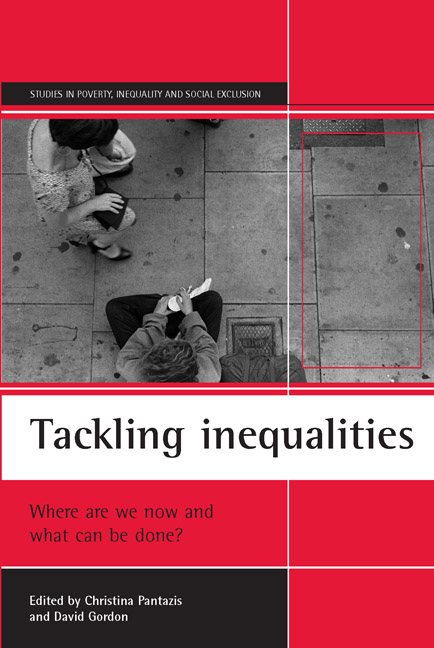Book contents
- Frontmatter
- Contents
- List of tables and figures
- Preface
- Acknowledgements
- List of acronyms
- Notes on contributors
- 1 Introduction
- 2 Inequalities in income, wealth and standard of living in Britain
- 3 Inequalities in employment: problems of spatial divergence
- 4 Educational inequalities and Education Action Zones
- 5 How can we end inequalities in housing?
- 6 Tackling inequalities in crime and social harm
- 7 Poverty across the life-course and health
- 8 Inequalities in health service provision: how research findings are ignored
- 9 A mortality league table for Cabinet ministers?
- 10 Ending world poverty in the 21st century
- Index
7 - Poverty across the life-course and health
Published online by Cambridge University Press: 05 July 2022
- Frontmatter
- Contents
- List of tables and figures
- Preface
- Acknowledgements
- List of acronyms
- Notes on contributors
- 1 Introduction
- 2 Inequalities in income, wealth and standard of living in Britain
- 3 Inequalities in employment: problems of spatial divergence
- 4 Educational inequalities and Education Action Zones
- 5 How can we end inequalities in housing?
- 6 Tackling inequalities in crime and social harm
- 7 Poverty across the life-course and health
- 8 Inequalities in health service provision: how research findings are ignored
- 9 A mortality league table for Cabinet ministers?
- 10 Ending world poverty in the 21st century
- Index
Summary
Introduction: poverty, inequality and health
The Black Report is justly celebrated for the attention it drew to the persistence of health inequalities after the introduction of the National Health Service (NHS) and for the framework of explanations for health inequalities it advanced (Davey Smith et al, 1994). Since the appearance of the Black Report, much of the focus of research into socioeconomic differentials in health has related to the continuous gradient of improving health from the bottom to the top of the socioeconomic hierarchy (Davey Smith et al, 1990a; Macintyre, 1994; Marmot, 1994). This focus on inequality and health represents a move from an earlier focus on poverty and health (M’Gonigle and Kirby, 1936; Titmuss, 1943) in which the poor health status of the most socially disadvantaged was the major concern. In terms of explanations for inequalities in health, the Black Report's categorisation of statistical artefact, selection, behavioural/ cultural and material factors has been developed into a set of considerations regarding the accumulation of exposures acting across the life-course and how, together, they produce the sizeable differentials in health status which are seen today.
Deprivation at different stages of the life-course and health: aetiological considerations
Several studies have demonstrated that lifetime social circumstances are strongly related to morbidity and mortality in adulthood (Mare, 1990; Davey Smith et al, 1997; Lynch et al, 1997; Power et al, 1998). For example, Figure 7.1 demonstrates that cumulative social class (indexed by the number of occasions from childhood to adulthood an individual was in a manual social class location) together with the deprivation level of current area of residence, are powerful predictors of mortality risk. Childhood and adult social circumstances make independent contributions to the risk of dying. Cumulative experience during adult life is also important. Individuals with average or higher income who experience fluctuating reductions to low income levels have higher mortality rates than those who remain on average or high incomes (McDonough et al, 1997). The highest mortality rates by a considerable degree are seen among those with persistently low incomes. Socioeconomic inequalities in health should be considered against the background of broad secular changes and international differences in health status and mortality risk.
- Type
- Chapter
- Information
- Tackling InequalitiesWhere Are We Now and What Can Be Done?, pp. 141 - 158Publisher: Bristol University PressPrint publication year: 2000



